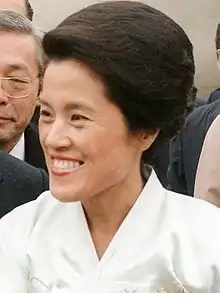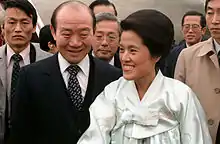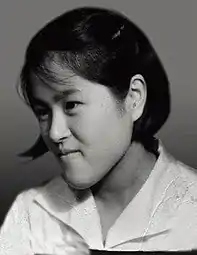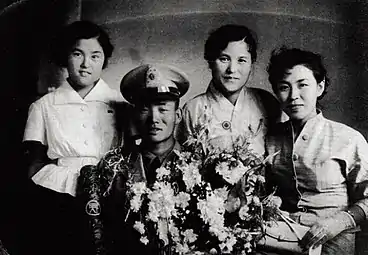Lee Soon-ja
Lee Soon-ja (Hangul: 이순자, Hanja: 李順子) (born 24 March 1939) is the wife of South Korean President Chun Doo-hwan. She was the first lady when Chun Doo-hwan was in office, from 1980 to 1988.[1]
Lee Soon-ja | |
|---|---|
 | |
| First Lady of South Korea | |
| Assumed office 1 September 1980 – 24 February 1988 | |
| President | Chun Doo-hwan |
| Preceded by | Hong Gi |
| Succeeded by | Kim Ok-suk |
| Personal details | |
| Born | 24 March 1939 Hsinking, Manchukuo, Empire of Japan (now Changchun, Jilin Province, China) |
| Spouse(s) | |
| Children | 4 |
| Religion | Buddhism (formerly Roman Catholic) |
| Lee Soon-ja | |
| Hangul | 이순자 |
|---|---|
| Hanja | |
| Revised Romanization | I Sunja |
| McCune–Reischauer | I Suncha |
Early life

Lee Soon-ja was born on March 24, 1939 in Hsinking, Manchukuo to Lee Gyu-dong and Lee Bong-nyeon. She is the second daughter of a family with three daughters and one son. Her father is originally from Seongju County at North Gyeongsang Province, and is the descendant of Lee Jo-yeon, a scholar and writer during the Goryeo Dynasty.[2]
Following the independence of Korea from the Japanese rule in 1945, the family moved back to the Korean Peninsula. Her father was appointed as an officer in the South Korean Army and went to fight in the Korean War. During this time, Lee attended the Jinhae Girls' Middle School in Changwon. Afterward, Lee followed her father to Seoul, where she attended and graduated from Gyeonggi Girls' Middle School and Gyeonggi Girls' High School.[3]
In 1957, she entered the medical school of Ewha Womans University, but gave up her dream of becoming a doctor and married Chun Doo-hwan, then an army officer in 1958. Because Chun Doo-hwan said that "it would only make her suffer", he was hesitant to get married. Nevertheless, Lee married Chun at January 24, 1958 in Daegu No.1 auditorium. At that time, Chun was 28 years old and Lee was 20 years old. This is the wedding that Lee unilaterally set a date and inform Chun of the wedding after confirming the location. Lee later completed a non-degree Senior Female Leader course at the School of Environment in Yonsei University.[4]
While talking to the men under her husband's command in the South Korean Army, Lee stated:[5]
"Life is very short, and the life of military wives is even shorter. You can't make your husband worry about housework in such a short period of time."
First Lady

When Chun Do-hwan became the 11th President of South Korea in 1980, after ruling the country as a de facto leader from 1979 to 1980, Lee Soon-ja became the First Lady of South Korea on 1 September 1980. During her time as First Lady, Lee accompanied Chun in all public events. In the 1980s, families in South Korea began to switch from black and white television to color television. Through color television, the first lady in her early 40s, dressed in gorgeous costumes and traditional dresses, made Koreans at the time proud. When Chun Doo-hwan was in power, the extravagant behavior of Lee Soon-ja and the financial fraud of her uncle's younger sibling became a social concern and was criticized by the South Korean society. As a result, she was satirized by the society as 'Yeonhui-dong's Red Pants', in reference to the neighborhood where her extravagant house was located.[6]
During her tenure in office, Lee Soon-ja, in particular, showed a lot of interest in educational issues and made a quantitative and qualitative contribution to the development of early childhood education and heart surgery among children. She left her position as First Lady after the resignation of Chun Doo-hwan following the June Democracy Movement in 1988.[7]
Later life
After his resignation from the presidency, Chun Doo-hwan fell into disgrace. He and his family were suspected of corruption. On November 23, 1988, Chun and Lee was forced to leave for the Pektamsa Buddhist monastery, where they spent two years.
On May 11, 2006, Lee was summoned by South Korea's Central Investigation Department on suspicion of managing about 13 billion won of illegal savings in May 2004. Her younger brother was later summoned on similar suspicion. Lee later claimed that the 13 billion won was what she had saved after a hard time, but it was allegedly containing a lot of fraudulent funds and was paid as a total surcharge. At the same time, the family still have to pay a gigantic amount of $370 million, stolen by Chun at one time from the country's budget. Lee and Chun's family are still paying this debt.[8][9]
On January 1, 2019, she created controversy when she stated that Chun Do-hwan was 'the father of Korean democracy'. Her statement was criticized by major South Korean political parties, except the Liberty Korea Party, Party for Democracy and Peace, Bareunmirae Party and Justice Party.[10][11][12]
Personal life
Lee and Chun Do-hwan have four children: three sons (Chun Jae-yong, Chun Jae-guk, Chun Jae-man) and daughter (Chun Hyg-sun).
Honours
_-_ribbon_bar.gif) Honorary Recipient of the Grand Order of Mugunghwa (1980)
Honorary Recipient of the Grand Order of Mugunghwa (1980)
In popular culture
- 4th Republic (1995) – Lee Sang Sook
- Korea Gate (1995) – Kyeon Mi-ri
- The Age of Three Kims (1998) – Lee Sang Sook
- 5th Republic (2005) – Kim Young-ran
Gallery
 Lee Soon-ja during her youth.
Lee Soon-ja during her youth. Chun Doo-hwan with Lee Soon-ja (left) and other relatives.
Chun Doo-hwan with Lee Soon-ja (left) and other relatives.
References
- June 30, 2009
- "전두환 前대통령, 대전 현충원 참배". daejonilbo.com. 1 July 2009. Retrieved 9 December 2020.
- "제11·12대 전두환 대통령 부인 이순자 여사". womennews.co.kr. 2 March 2007. Retrieved 9 December 2020.
- "[내가 본 이순자] 좌담회에서 드러난 이 여사의 스타일". womennews.co.kr. 2 March 2007. Retrieved 9 December 2020.
- "[내가 본 이순자] 좌담회에서 드러난 이 여사의 스타일". womennews.co.kr. 2 March 2007. Retrieved 9 December 2020.
- "활발한 내조 – 이순자 여사". ynamnews.co.kr. 10 February 2019. Retrieved 9 December 2020.
- "활발한 내조 – 이순자 여사". ynamnews.co.kr. 10 February 2019. Retrieved 9 December 2020.
- "350 Artworks Confiscated from Chun Doo-hwan's Son". english.chosun.com. 19 July 2013. Retrieved 9 December 2020.
- Choe Sang-Hun (16 July 2013). "Prosecutors Raid Home of Former South Korean President". nytimes.com. Retrieved 9 December 2020.
- "이순자 "내 남편 전두환은 민주주의의 아버지"". news.joins.com. 1 January 2019. Retrieved 9 December 2020.
- "여야 "남편 전두환은 민주주의 아버지" 이순자 일제 규탄…한국당만 침묵". hani.co.kr. 2 January 2019. Retrieved 9 December 2020.
- Kim Arin (2 January 2019). "Ex-dictator's wife calls husband 'father of democracy'". koreanherald.com. Retrieved 9 December 2020.
External links
| Honorary titles | ||
|---|---|---|
| Preceded by Hong Gi |
First Lady of South Korea 1 September 1980 – 24 February 1988 |
Succeeded by Kim Ok-suk |
